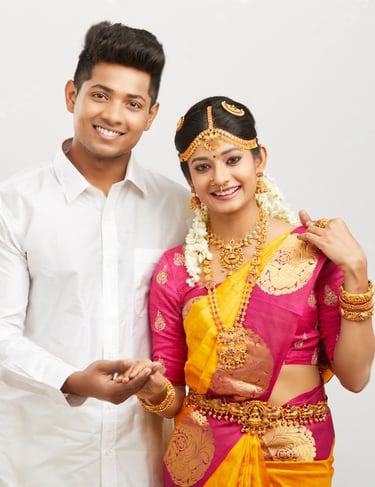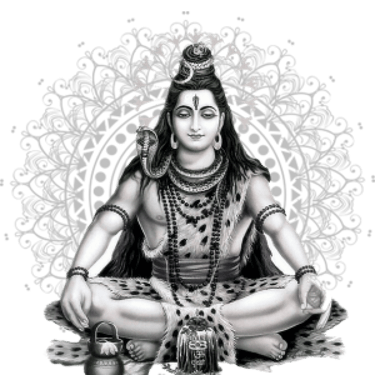
Wedding Muhurat Fixing
Auspicious tithi:
The tithi days of Dwitiya, Tritiya, Panchami, Ekadashi, Trayodashi, and Chaturdashi will give the best auspicious results. The tithi days of Shasthi, Saptami, Dashami, and Dwadashi are average days. It is not advisable to have a wedding on Prathama, Chaturthi, Navami, Amavasya, and Pournami days.
Auspicious star:
Aswini, Rohini, Pushya, Astham, Anusham, Moolam, Thiruvonam, Uttaratham, and Revathi are the most auspicious stars. Parani, Mrugasheersham, Aayilyam, Magam, Pooram, Uthram, Swathi, Kettai, Pooradam, Uthiradam, Avittam, and Sathya are average stars. Avoid auspicious activities in Krithika, Thiruvadhirai, Punarpoosam, Chitra, Visakam, and Pooradam stars.
Timeless, headless and headless stars:
Timeless, headless and headless stars are also closely related to married life.
The stars of the sun, Mars, and Jupiter can also be called broken stars. If the muhurat is marked in these broken stars, it will cause mental stress in married life.
The first quarter of the stars of the sun, Krithika, Uthram, and Uthiradam are in one zodiac sign and the other two, three, and four quarters are in the next zodiac sign. Therefore, these are called headless stars.
The first and second quarters of the stars of Mars, Mrugasheersham, Chitra, and Avittam are in one zodiac sign and the third and fourth quarters are in the next zodiac sign. Therefore, these are called headless stars.
The first, second, and third quarters of the stars of Jupiter, Punarpoosam, Visakam, and Pooradam are in one zodiac sign and the fourth quarter is in the next zodiac sign. Therefore, these are called headless stars.
Amritadi yogas, Prabalarishta yogas:
These are formed by the combination of day and star. Only Amrita and Siddha yogas are suitable for muhurat. Avoid death and Prabalarishta yoga days. According to this, the following combinations will create Prabalarishta yoga when the day and star are combined.
Sunday - Parani
Monday - Chitra
Tuesday - Uthiradam
Wednesday - Avittam
Thursday - Kettai
Friday - Pooradam
Saturday - Revathi
Tharabalam:
It is very special if the day of the muhurat has Tharabala. If the number obtained by adding the number of the star from the birth star to the day of the muhurat is divided by 9, the remainder is 0, 2, 4, 6, or 8, then those are stars with Tharabala. If it is 1, 3, 5, or 7, then they are stars without Tharabala.
Auspicious lagna:
Lagna with strength and auspicious vision is suitable for auspicious events. Generally, Taurus, Gemini, Cancer, Virgo, Libra, Sagittarius, and Aquarius lagna in the month of March are excellent. It is good to avoid Aries, Leo, and Scorpio lagna. In addition, the lagna with the strength of panchakam and the golden lagna that occurs half a nazhigai before and after sunrise are suitable for auspicious events. The muhurat lagna is very important.
How to calculate Panchakam
Panchakam is a five-part system used to determine auspicious times for events such as weddings, housewarmings, and business ventures. The five parts are:
Tithi: The lunar day, which is numbered from 1 to 30.
Vaara: The day of the week, which is one of the seven days of the week.
Nakshatra: The lunar mansion, which is one of the 27 lunar mansions.
Lagnam: The ascendant, which is the zodiac sign that is rising on the eastern horizon at the time of the event.
Dhruvam: The pole star, which is the star around which the other stars appear to revolve.
To calculate Panchakam, you first need to determine the tithi, vaara, and nakshatra for the event. You can do this by using a Hindu calendar or online calculator. Once you have these three values, you can use the following formula to calculate the lagnam:
lagnam = (tithi * vaara) % 9
For example, if the tithi is 10, the vaara is Monday, and the nakshatra is Rohini, then the lagnam is (10 * 2) % 9 = 2.
Once you have the lagnam, you can use the following formula to calculate the dhruvam:
dhruvam = (lagnam * 7) % 12
For example, if the lagnam is 2, then the dhruvam is (2 * 7) % 12 = 10.
The Panchakam is calculated by adding the values of the tithi, vaara, nakshatra, lagnam, and dhruvam. If the sum is divisible by 9, then the time is auspicious. If the sum is not divisible by 9, then the time is inauspicious.
General rules for avoiding inauspicious times for weddings
In addition to the Panchakam, there are a number of other general rules that should be followed when avoiding inauspicious times for weddings. These rules include:
Avoid weddings during the month of Marghali (December-January).
Avoid weddings during the last three days of the month.
Avoid weddings during the amavasya (new moon) or purnima (full moon).
Avoid weddings during the Rahu Kalam, Yamagandam, or Gulika Kalam (unfavorable astrological periods).
Avoid weddings during a solar or lunar eclipse.
Avoid weddings if the groom or bride is in the astama star (eighth star) of their birth chart.
Avoid weddings if the groom or bride is in the 3rd, 5th, 7th, 10th, 14th, 19th, 22nd, or 27th star of their birth chart.
Avoid weddings if the groom or bride is in the jeeva, anuja, or trija star (same star as their birth star).
Avoid weddings if the groom or bride is menstruating.
Avoid weddings if the groom or bride has any astrological afflictions.
The bird of the nakshatra of the person to be married and the bird of the muhurat nakshatra should not be in a sleeping or death-related position on the day of the wedding.
If the strength of Guru, Chandra, and Dasa Bhukti are not correct, then the wedding muhurat days can be postponed. In some cases, if there is a situation where the wedding has to be conducted due to unavoidable reasons, then the time when the sun is in the 11th house of the lagna can be used.
In numerology astrology, the number 8 is considered to be an inauspicious number.
Therefore, the wedding date should not be 8. Similarly, weddings should not be conducted on dates with the numbers 4, 5, or 7.
Marriage, rain, childbirth, and all such things are the grace of God. The auspicious day mentioned above is said to be the day when one experiences divine intervention. This is because humans, without exception, come into this world to experience some form of destiny. Therefore, in the conditions mentioned above, it is essential to consider it as a very auspicious and special moment.
If a person who has learned the scriptures and astrology speaks about an auspicious time, that time will undoubtedly be a good and auspicious moment.
If a favorable event occurs on a day that aligns with the lunar day, star, and auspicious time, and if it corresponds to the astrological configurations, then that auspiciousness will manifest for a long time, bringing prosperity. The auspicious time will be certain to bring about positive outcomes when it aligns with the family deity, ancestral deity, worship deity, elders, sons, and the favorable moments chosen with love and respect for the parents.
May goodness prevail in your life!...
Live prosperously!...
Warm wishes from Pondicherry Krishna.
Marriage and auspicious event muhurat determination
Auspicious muhurat time is one and a half hours
Man can change his life to his advantage by using the muhurat given by God.At the time of putting the mangalsutra around the neck of the bride, blessings should be obtained from the family deity, family deity, ancestors, trinity, gods, relatives, elders, and parents. Only when the mangalsutra is worn on a good day and a good time, the marriage will be a happy life.It is customary to look at the good time to perform the auspicious event as soon as the decision is made for the auspicious event.If all the auspicious events that occur in everyone's life are arranged at a good auspicious muhurat time, life will be good.
Rules for selecting muhurat
Auspicious week: Days with two eyes, such as Monday, Wednesday, Thursday, and Friday, are suitable for auspicious events. Sunday is a day with one eye, so it is an average day. It is not good to have a wedding on Tuesday or Saturday.


Mr. nline Astro
Contact us
krishna@mronlineastro.com
+919940864640

Get Online Consultation through Mail or Phone Call From Top Famous Astrologer R.Krishna for ✔Marriage ✔Career ✔Business ✔Health ✔Education ✔Money. If you want Direct Consultation, You should phone and get your appointment Date and Time before you visit.
Quick links
Copyright 2026 @ Mr. Online Astro.com | All rights reserved. Designed by Mr.NSK !!
+919789732289
